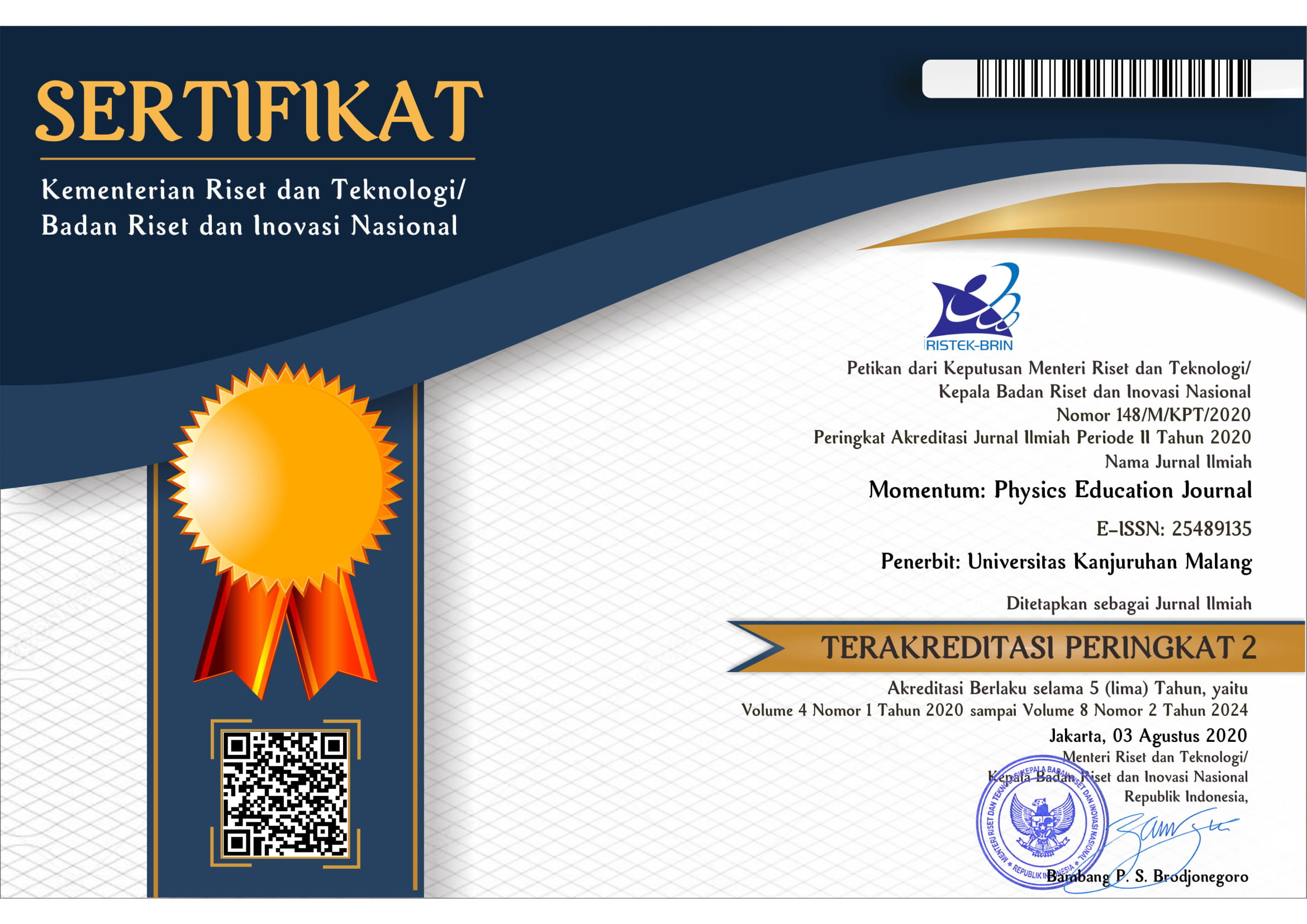Membangun Pedagogical Content Knowledge Calon Guru Fisika Melalui Praktek Pengalaman Lapangan Berbasis Lesson Study
DOI:
https://doi.org/10.21067/mpej.v1i1.1629Keywords:
pedagogical content knowledge, teaching practice, lesson studyAbstract
The article is a study about the importance of pedagogical content knowledge (PCK) for prospective physics teachers of through teaching practice based on lesson study. PCK is an important aspect in the process of equipping prospective teachers are influenced by various factors. Teaching practice based on lesson study is an alternative model of PCK briefing on prospective physics teachers. It is supported by the results of studies  that PCK of prospective physics teachers may be affected by their experience of learning and teaching for a college education.
ÂÂ
Keywords: pedagogical content knowledge, teaching practice, lesson study
ÂÂ
Artikel merupakan kajian tentang pentingnya pedagogical content knowledge (PCK) untuk calon guru Fisika melalui praktek pengalaman lapangan (PPL) berbasis lesson study. PCK merupakan aspek penting dalam proses pembekalan calon guru yang dipengaruhi oleh berbagai faktor. PPL berbasis lesson study menjadi salah satu alternatif model pembekalan PCK pada calon guru. Hal ini didukung hasil-hasil penelitian yang menunjukkan bahwa PCK calon guru dapat dipengaruhi oleh pengalaman melaksanakan pembelajaran dan proses palatihan selama pendidikan di perguruan tinggi.
ÂÂ
Kata Kunci: pedagogical content knowledge, praktek pengalaman lapangan, lesson study
Downloads
References
Akerson, V.L, Pongsanon, K. Rogers, M.A.P. Carter, I., & Galindo, I (2017). Exploring the Use of Lesson Study to Develop Elementary Preservice Teachers’ Pedagogical Content Knowledge for Teaching Nature of Science. Int J of Sci and Math Educ, 15:293–312
BSNP. (2011). Antisipasi Terhadap Pergeseran Paradigma Pendidikan Tinggi Abad XXI. Laporan Survei. Jakarta: Badan Standar Nasional Pendidikan.
Depdiknas, (2008). Panduan Pelaksanaan Lesson Study di LPTK. Jakarta: Depdikna
Falk, A. (2011). Teachers Learning from Professional Development in Elementary Science: Reciprocal Relations between Formative Assessment and Pedagogical Content Knowledge. Science Education, 96: 265–290.
Fraser, S.P. (2016). Pedagogical Content Knowledge (PCK): Exploring its Usefulness for Science Lecturers in Higher Education. Res Sci Educ, 46:141–161.
Geddis, A. N. (1993). Transforming subject-matter knowledge: the role of pedagogical content knowledge in learning to reflect on teaching. International Journal of Science Education, 15(6), 673–683.
Gess-Newsome, J., Taylor, J.A., Carlson, A., Gardner, A. L., Wilson, C.D., & Stuhlsatz, M.A.M. (2017). Teacher pedagogical content knowledge, practice,and student achievement. International Journal Of Science Education.
Halim, L., & Meerah, S. (2002 ).Science Trainee Teachers’Pedagogical Content Knowledge and Its Influence on Physics Teaching. Research in Science and Technological Education, 20 (2): 215–225.
Hanuscin, D. L. (2013). Critical incidents in the development of pedagogical content knowledge for teaching the nature of science: A prospective elementary teacher’s journey. Journal of Science Teacher Education, 24, 933–956.
Henze, I., Van Driel, J & Verloop, N. (2008). Development of Experienced Science Teachers’Pedagogical Content Knowledge of Models of the Solar System and the Universe. International Journal of Science Education, 30 (10): 1321–1342.
Karal, I.S. & Alev, N. (2016). Development of pre-service physics teachers’pedagogical content knowledge (PCK) throughout their initial training. Teacher Development, 20 (2), 162–180
Kirschner, S. Borowski, A. & Fischer, H.E (2011). University Duisburg-Essen Physics Teachers’ Content Knowledge and Pedagogical Content Knowledge: Developing Test Scales and Measuring the Relation, Stand-Alone Paper. Presented at NARST 2011.
Lee, E., & Luft. J.A., (2008). “Experienced Secondary Science Teachers’ Representation of Pedagogical Content Knowledge.†International Journal of Science Education, 30 (10):1343–1363
Lewis, C.C. (2002). Lesson study: A Handbook of Teacher-Led Instructional Change. Philadelphia, PA: Research for Better Schools, Inc.
Marble, S. (2007). Inquiry into teaching: Lesson study in elementary science methods. Journal of Science Teacher Education, 18, 935–953.
National Research Council. (1996). Executive Summary of National Science Education Standards, (Online), (http://executivesummary.pdf)
Nilsson, P. (2008). Teaching for understanding: The complex nature of pedagogical content knowledge in preservice education. International Journal of Science Education, 30(10), 1281–1299.
Riese, J. (2009). Professional knowledge and professional competence of (pre-service) physics teachers, Berlin: Logos.
Shulman, L. (1986). Those who understand: Knowledge growth in teaching. Educational Researcher, 15(2), 4–14.
Sutopo & Ibrohim. (2006). Pengalaman IMSTEP dalam Implementasi Lesson Study. Makalah disajikan dalam Pelatihan Pengembangan Kemitraan LPTK-Sekolah dalam rangka Peningkatan Mutu Pembelajaran MIPA di Yogyakarta, 27-29 Juli 2006.
Tim Pengembang PPL-UM. (2011). Petunjuk Teknis Pelaksanaan Lesson Study Universitas Negeri Malang. Malang: Unit Pelaksana Teknis Praktik Pengalaman Lapangan (UPT-PPL) Universitas Negeri Malang
Van Driel, J. H., Jong, O.D., & Verloop, N. (2002). The Development of Preservice Chemistry Teachers’ Pedagogical Content Knowledge. Science Education, 86 (4): 572–590.
Van Driel, J. H., N. Verloop, & W. de Vos. (1998). Developing Science Teachers’Pedagogical Content Knowledge. Journal of Research in Science Teaching, 35 (6): 673–695.
Veal, W. R., Tippins, D. J., & Bell, J. (1998). The Evolution of Pedagogical Content Knowledge in Prospective Secondary Physics Teachers. Paper presented at the annual meeting of the National Association for Research in Science Teaching, San Diego, CA, April.
Downloads
Published
How to Cite
Issue
Section
License
Copyright (c) 2017 Momentum: Physics Education Journal

This work is licensed under a Creative Commons Attribution-ShareAlike 4.0 International License.


.png)
.png)
.png)
.png)




